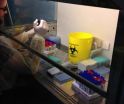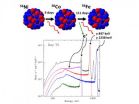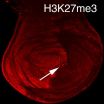(Press-News.org) Auckland, New Zealand (29 August) — Science advice to governments has emerged as a discipline in its own right, which is both art and science. This is what delegates to the world's first summit of science advice heard at a meeting in Auckland, which closed today with a strong call to strengthen international collaboration, an agreement to formalise the network and meet again in 2016.
Convened by the International Council for Science (ICSU) and hosted by New Zealand's Chief Science Advisor, Sir Peter Gluckman, this historic summit marks a turning point in the global awareness that robust and credible science has an important place in public policy making. The conference brought together some 200 participants including science advisors, senior officials, representatives of national academies, experts and scholars from more than 40 countries across Africa, the Asia-Pacific region, Europe, the United States, Canada and Latin America.
"Our goal was to start a global conversation on the practices and challenges of conveying science advice to governments," said Sir Peter Gluckman. "As brokers of knowledge, science advice practitioners aim to communicate what is known and what is not known in such a way as to assist decision makers in balancing evidence, social values and other imperatives in the policy process. This is no small task, particularly in contentious areas of policy, where public concern is high and the science is inevitably uncertain."
"The meeting has highlighted a real thirst among practitioners to share models and lessons. I think we have experienced an unprecedented moment of awareness which we should seize and harness for action globally," said Sir Peter.
The role of science advisor can at times be controversial. Science Advisor to EU President Jose-Manuel Barroso, Anne Glover gave a candid account of some of the challenges she has faced. "There is no point having a Chief Science Advisor and not taking advantage of them," she said.
"The diversity of cultural approaches to science advice cannot be underestimated, and one size does not fit all. Without networks which connect practitioners of science advice, we are missing something," she added, referring to the opportunities presented by conference.
Participants agreed that science advice was critical for underpinning everything from economic growth through poverty alleviation, international trade, diplomacy, sustainable development to disaster risk management.
"Many governments around the world have recognised the need to inform their policy decisions with the best knowledge available," said Steven Wilson, Executive Director of the International Council for Science (ICSU). "I am thrilled that the practitioners working at this critical interface are strengthening their ties to build the practice and learn from each other."
Another focus of discussion was the experience of early career scientists who are often at the leading edge of new scientific thinking. Jacqueline McGlade, Chief Scientist at UNEP, said one of the roles of science advisors was to protect and nurture these new perspectives in order to ensure continual progress in the provision of science advice.
Speaking at the summit, Romain Murenzi, the executive director of The World Academy of Science (TWAS), which represents the academies of the developing world, underlined the importance of strengthening collaboration among science advisory structures worldwide. "We need to get to a place where the science culture is pervasive and where we can truly say there is scientifically literate society. The role of science advice to government plays a big role in this," he said.
The two-day summit was designed to promote open discussion on the provision of science advice in some of the most challenging policy contexts: situations of crisis; when evidence is in conflict with political views; and when evidence must cross geopolitical borders and cultures. Key themes that emerged from the delegates' discussions included the importance of recognising the broad social context in which science is undertaken and applied; the value of involving policy makers and public alike in shaping the questions that science can begin to answer; and a commitment to greater collaboration amongst practitioners of advice to advance principles and accountabilities in brokering knowledge that can both honour and transcend our diversity.
The summit ended with a strong call to build upon the energy and enthusiasm generated within this growing network of practitioners. Sir Peter will chair the development of a more formal network supported by an expanded organising committee. Multinational organisations ICSU and the OECD Global Science Forum are working with organisers to take the initiative forward. Workshops on specific issues will be held over the next two years and a 2nd Global Conference on Science Advice to Governments will be held in Europe in 2016.
INFORMATION:
Full details of the meeting proceedings are available here: http://www.globalscienceadvice.org/
The conference organising committee comprises:
Dr. John Boright, Executive Director of International Affairs at US National Academies
Dr. Claus Hviid Christensen, former Chair of Danish Council for Research Policy
Sir Peter Gluckman, Prime Minister's Chief Science Advisor, New Zealand
Dr. Anne Glover, Chief Scientific Adviser to the President of the European Commission
Dr. Romain Murenzi, Executive Director of The World Academy of Sciences (TWAS)
Dr. Carlos Nobre, National Secretary, Research and Development, Ministry of Science, Technology and Innovation, Brazil; and appointed member of UN Scientific Advisory Board
Sir Mark Walport, Government Chief Science Adviser, UK
Dr. James Wilsdon, Professor of Science and Democracy, University of Sussex
Dr. Steven Wilson, Executive Director of International Council for Science (ICSU)
Dr. Hamid Zakri, Prime Minister's Science Advisor, Malaysia; founding Chair of the Intergovernmental Science Policy Platform on Biodiversity and Ecosystem Services (IPBES); and appointed member of the UN Scientific Advisory Board.
Science advice to governments comes of age at Auckland conference
2014-08-29
ELSE PRESS RELEASES FROM THIS DATE:
Intervention needed for survivors of childhood burns
2014-08-29
Adults who have been hospitalized for a burn as a child experience higher than usual rates of depression and suicidal thoughts, according to new research at the University of Adelaide.
A 30-year follow up of childhood burns victims has been conducted by the University's Centre for Traumatic Stress Studies. They found that 42% of people surveyed had suffered some form of mental illness and 30% suffered depression at some stage in their lives.
The results, now published in the journal Burns, also found that long-term depression was an issue among the group, and 11% had ...
Can YouTube save your life?
2014-08-29
Only a handful of CPR and basic life support (BLS) videos available on YouTube provide instructions which are consistent with recent health guidelines, according to a new study published in Emergency Medicine Australasia, the journal for the Australasian College for Emergency Medicine (ACEM).
Early recognition and treatment of sudden cardiac arrest are known to improve survival for
victims.
A team of Turkish emergency medicine specialists put together the study, which reviewed educational videos from the last three years accessed via YouTube when the search terms ...
Rapamycin or FK506, which is better for SCs migration and peripheral nerve repair
2014-08-29
FK506 possesses a well-studied neuroregenerative effect, stimulating neurite extension in the presence of nerve growth factor in vitro, and enhancing nerve regeneration following nerve crush injury and isografting. However, the use of FK506 to stimulate nerve regeneration is limited because of the risk of renal failure and hypertension, and its considerable cost. With long-term allografts, FK506 alone or combined with other drugs reportedly cause life-threatening infections. Like FK506, rapamycin is an immunosuppressant and FKBP-12-binding ligand, and has a neuroregenerative ...
MERS: Low transmissibility, dangerous illness
2014-08-29
The MERS coronavirus has caused disease outbreaks across the Arabian Peninsula and spread to Europe several times. The severe pneumonia virus has claimed the lives of several hundred people since its discovery in 2012. For a long time, scientists have been puzzled over how easily the pathogen spreads from human to human. An international team of researchers led by virologists from the University of Bonn have now come to the conclusion, through direct observation, that the rate of human transmission is low. Still, a third of infected persons with symptoms die. The results ...
Astrophysicists report radioactive cobalt in supernova explosion
2014-08-29
A group of astrophysicists, including researchers from MIPT, have detected the formation of radioactive cobalt during a supernova explosion, lending credence to a corresponding theory of supernova explosions. Details are given in the journal Nature, one of the most cited scientific publications in the world.
The article's main author, Yevgeny Churazov (Space Research Institute of the Russian Academy of Sciences), together with his co-authors, including Sergei Sazonov of the Space Research Institute and MIPT, reported the results of their analysis of data collected with ...
Cellphone addiction 'an increasingly realistic possibility,' Baylor study finds
2014-08-29
Women college students spend an average of 10 hours a day on their cellphones and men college students spend nearly eight, with excessive use posing potential risks for academic performance, according to a Baylor University study on cellphone activity published in the Journal of Behavioral Addictions.
"That's astounding," said researcher James Roberts, Ph.D., The Ben H. Williams Professor of Marketing in Baylor's Hankamer School of Business. "As cellphone functions increase, addictions to this seemingly indispensable piece of technology become an increasingly realistic ...
'K-to-M' histone mutations: How repressing the repressors may drive tissue-specific cancers
2014-08-29
Kansas City, MO. - In a cell's nucleus, chromosomal DNA is tightly bound to structural proteins known as histones, an amalgam biologists call chromatin. Until about two decades ago, histones were regarded as a nuclear "sidekick," the mere packing material around which the glamorous DNA strands were wrapped. Recently, however, biologists have developed a greater appreciation for how DNA/histone interactions govern gene expression.
In 2012, investigators from multiple research institutions studying the sequence of the genome from cancer patients rocked the "chromatin world" ...
Copper shines as flexible conductor
2014-08-29
Bend them, stretch them, twist them, fold them: modern materials that are light, flexible and highly conductive have extraordinary technological potential, whether as artificial skin or electronic paper.
Making such concepts affordable enough for general use remains a challenge but a new way of working with copper nanowires and a PVA "nano glue" could be a game-changer.
Previous success in the field of ultra-lightweight "aerogel monoliths" has largely relied on the use of precious gold and silver nanowires.
By turning instead to copper, both abundant and cheap, ...
Meaningful relationships can help you thrive
2014-08-29
In brief:
The definition of thriving involves 5 components of well-being
Relationships provide 2 types of support: source of strength (SOS) support, and relational catalyst (RC) support
Support-providers must be sensitive and responsive—there are characteristics in a support-provider that can lead to doing more harm than good
Future research should focus more on social support in non-adverse life circumstances
Deep and meaningful relationships play a vital role in overall well-being. Past research has shown that individuals with supportive and rewarding relationships ...
Plug n' play protein crystals
2014-08-29
Almost a hundred years ago in 1929 Linus Pauling presented the famous Pauling's Rules to describe the principles governing the structure of complex ionic crystals. These rules essentially describe how the arrangement of atoms in a crystal is critically dependent on the size of the atoms, their charge and type of bonding. According to scientists from the Biohybrid Materials Group of Aalto University Finland led by Mauri Kostiainen similar rules can be applied to prepare ionic colloidal crystals consisting of oppositely charged proteins and virus particles. The results can ...





